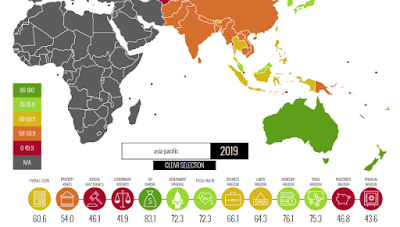 |
| Source: Henley & Partners, from the 2019 Index of Economic Freedom – The Heritage Foundation. |
Asian countries have a lead in the Henley Passport Index, the original ranking of all the world’s passports according to the number of destinations their holders can access without a prior visa. For the third consecutive year, Japan has secured the top spot on the index — which is based on exclusive data from the International Air Transport Association (IATA) — with a visa-free/visa-on-arrival score of 191.
Japan’s passport received visa on arrival access to KSA with a score of 190. Singapore is in 2nd place while South Korea is in 3rd place alongside Germany (despite gaining 1 score point). Both countries give their passport holders visa-free/visa-on-arrival access to 189 destinations worldwide.
The UAE, on the other hand, climbed a record 47 places over the past 10 years and is now 18th, with a visa-free/visa-on-arrival score of 171. Afghanistan remains at the bottom of the index, with its nationals only able to visit 26 destinations visa-free. Analysis of historical data from the index reveals that this global mobility gap is the starkest it has been since the index’s inception in 2006.
Dominic Volek, Head of Southeast Asia and Managing Partner, Henley & Partners, said, “The benefits of open-door policies and mutually beneficial trade agreements can no longer be denied. Based on our ongoing research, countries that embrace this new reality of global mobility are thriving, with their citizens enjoying ever-increasing passport power and travel freedom, as well as the array of benefits that come with it.”
Using exclusive historical data from the Henley Passport Index, political science researchers Uğur Altundal of Syracuse University, and Ömer Zarpli from the University of Pittsburgh, have found that there is a strongly positive correlation between travel freedom and other kinds of liberties – from the economic to the political, and even individual or human freedoms.
Altundal and Zarpli observe that “there’s a distinct correlation between visa freedom and investment freedom, for instance. Similar to trade freedom, countries that rank highly in investment freedom generally have stronger passports.”
One especially striking example of the positive correlation is Singapore, which ranks highest in nearly all economic indicators. Henley & Partners said that Singapore’s scores on the economic indicators are "far above the average for Asia Pacific". While the region scored particularly low on indicators such as judicial effectiveness and government integrity, Singapore had near perfect scores, the consultancy said.
The impact of these and other key developments is analysed in depth in the 2020 edition of the Henley Passport Index and Global Mobility Report — a publication that offers analysis and commentary from scholars and professional experts on the latest trends shaping international and regional mobility patterns today.
Commenting in the report, Dr Parag Khanna, bestselling author and the Founder and Managing Partner of FutureMap in Singapore, said, “Migration, as with almost everything else, is a function of supply and demand — and, increasingly, it is accepted that more migration creates more demand, stimulating much needed economic growth. As the world economy heads into a synchronised slowdown, we must view migration as part of the solution, not the problem.”
Khanna points out that with the US-China trade war showing no signs of decelerating, Western investment has shifted out of China towards Southeast Asia, bringing a new wave of foreign talent into ASEAN countries that have encouraged greater migration through streamlined visa policies. Thailand’s strong upward movement in the Henley Passport Index’s rankings over the past year is a clear illustration of this emerging trend; benefitting from mutually reciprocal visa waivers, the country has climbed three spots in the past year and now sits in 65th place, with a visa-free/visa-on-arrival score of 78.
Middle Eastern countries have also made strong gains as part of overall efforts to boost trade and tourism. The UAE and KSA each climbed four places, while Oman climbed three. KSA is now in 66th place, with citizens able to access 77 destinations around the world without a prior visa, while Oman sits at 64th place, with a visa-free/visa-on-arrival score of 79.
Despite these positive regional developments, Dr. Lorraine Charles, Research Associate at the University of Cambridge’s Centre for Business Research, warns that migration and mobility trends in the Middle East are largely driven by conflict, which looks set to continue in 2020. Citing deepening conflicts in Libya, Syria, and Yemen, and with renewed anti-government protests in Egypt, Iraq, and Lebanon, Charles notes that “forced displacement will most likely continue to dominate migration and mobility patterns within the Middle East.”
Professor Simone Bertoli, Professor of Economics at Université Clermont Auvergne (CERDI) in France, says that while countries around the world insist that they are taking steps to attract “the best and the brightest”, a rather different picture is currently emerging: “When it comes to talent migration, a worrying gap between policy and rhetoric has been opening up over the past year. The sluggish improvement of labor market conditions after the 2008 crisis, and the concomitant rise of nativist political parties, is reinforcing the perception of immigration as a threat rather than as an opportunity.”
Volek adds: “Both demand and supply for investment migration programmes have grown globally signalling more than just the need for a competitive advantage, but rather it is now seen as an unrefuted requirement in today’s volatile world. The increased interest not just from investors seeking travel freedom, security and mobility, but also from sovereign states looking to strengthen and diversify their economies is a strong indicator for the continued growth of the investment migration industry in 2020.